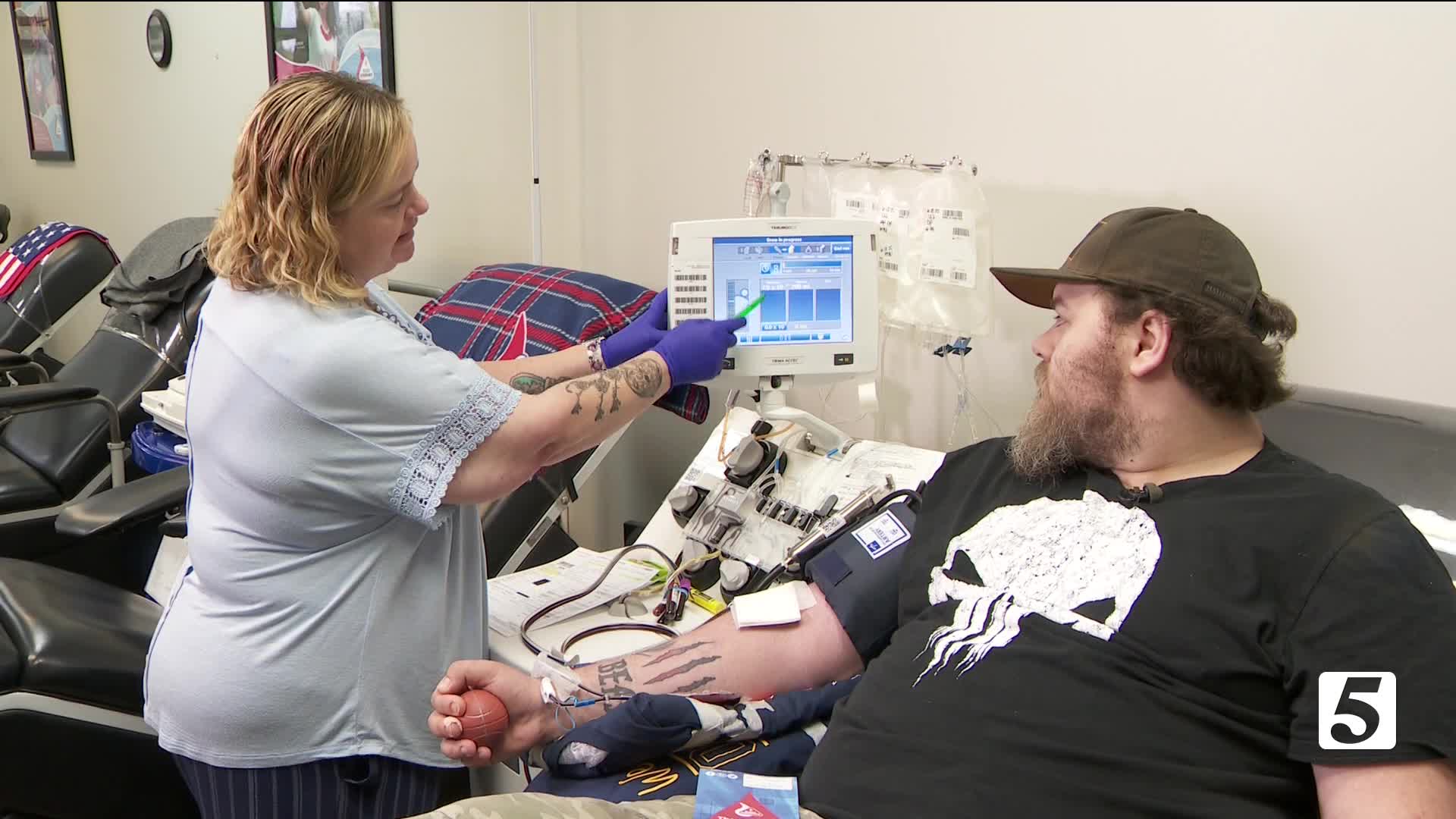NASHVILLE, Tenn. (WTVF) — Giving blood can seem like a mundane task, but the process is anything but ordinary.
In an exclusive story, our team followed a donation of platelets from a donor's arm to its grateful recipient, and we learned everything that happens in between.
It all started at a blood donor center in Columbia, Tenn., where a man named Dylan Frost donated platelets and plasma for the first time.
Once he's hooked up and blood starts flowing, it all starts with a special machine.
"This is the centrifuge," explained an employee as Frost's blood was drawn. "This is what's spinning and separating those platelets, red cells, and plasma."
Part One: Follow the Blood
The centrifuge essentially filters the platelets, which are small, colorless cells that help the blood clot, out, while pumping the rest of his blood back into his body. After about an hour, Dylan's unit goes into a shaking contraption called an agitator.
"Then we rock them. Kind of relaxes them," the worker said.
Later, it's all packed up in a cardboard box and ready to be picked up by a courier that will take it to the collection location in Nashville. From there, the donations are driven all the way to the testing site in Chattanooga.
A look at our journey from donor to patient

The platelets spend hours on the road, but time is ticking. If they're out too long, they'll die, rendering them useless, and the whole process for nothing.
Thankfully, they make it to the Blood Assurance headquarters in Chattanooga.
"We're the only facility that processes the blood," explained one Blood Assurance employee.
Normal blood donations are brought to a specific lab, where they're separated in a centrifuge, then tested, filtered, and stored in a cool place.
Frost's platelets, however, have a special separate lab, where they're tested to see how many are viable. They're later tested for diseases like HIV, Hepatitis, or STDs.
"That can be passed on and it'd be fatal, so they are definitely making sure that they're doing their due diligence," the employee continued.
After getting all the air out, the platelets set up shop in an illumination machine, a process unique to platelets.
"This is basically a way of starving out anything that could be in there, just so that way we're getting the most sterile product," said a platelet specialist.
Part Two: Follow the Blood
The platelets then end up in a designated refrigerator, or agitator, where shaking them avoids any clumping. They'll stay there for 12 to 24 hours.
As soon as there's a need, they'll be cleared, labeled, and on their way to a hospital.
With a shelf life of only about a week, they have to move quickly.
About 36 hours after Frost's donation in Columbia, and rigorous testing and preparation at the blood lab in Chattanooga, Frost's platelets head to Vanderbilt University Medical Center.
After a quick visual inspection and a check-in into the computer system, the platelets are popped back into an agitator. This is only temporary — because in just minutes, they are delivered to the hospital room and to the patient that needs them.
The recipient is 30-year-old Marqual McCurdy. He has Hodgkin's lymphoma, and he's needed multiple blood transfusions this week.
But thanks to this last donation of platelets from Dylan, he's going home.
Before leaving, he was able to watch a video with a message from his donor.
"I hope you do better. I hope this helps you a lot...and I wish you the best of luck, and you'll be in my prayers," said Frost in a video.
"That is honestly surprising. You never know who you're getting blood from," McCurdy reacted after seeing the video. "All I can say is thank you. I still don't even know his name, but...thank you. That's all I can say."
"Really, to be honest, I was expecting some old man," he went on, laughing. "He looks about my age. He looks like somebody I played football against or something."
He says he's thankful for Frostn and everyone who chooses to donate.
"If it wasn't for them, I would not be here. Without their blood or their plasma, I would not be here. I would not be on this Earth anymore. So I'm very grateful for everyone who's ever donated," he said. "It will always change my life. It will always change my world. It will always be the reason I keep going."
It takes a journey to get here, but that journey changes lives.
If you're interested in donating blood, platelets, or plasma, there's always a need. You can find a list of donor centers on the Blood Assurance and the Red Cross websites.
Do you want to learn more about a health-related issue? You can email me at Nikki.Hauser@NewsChannel5.com.

The news surrounding student loan repayment has been ever-changing over the last few years. When it comes to your money, confusion is never a good thing. Thankfully, Robb Coles helps us sort out the path forward. Check out his story for some practical tips and insight behind the latest changes.
- Carrie Sharp






